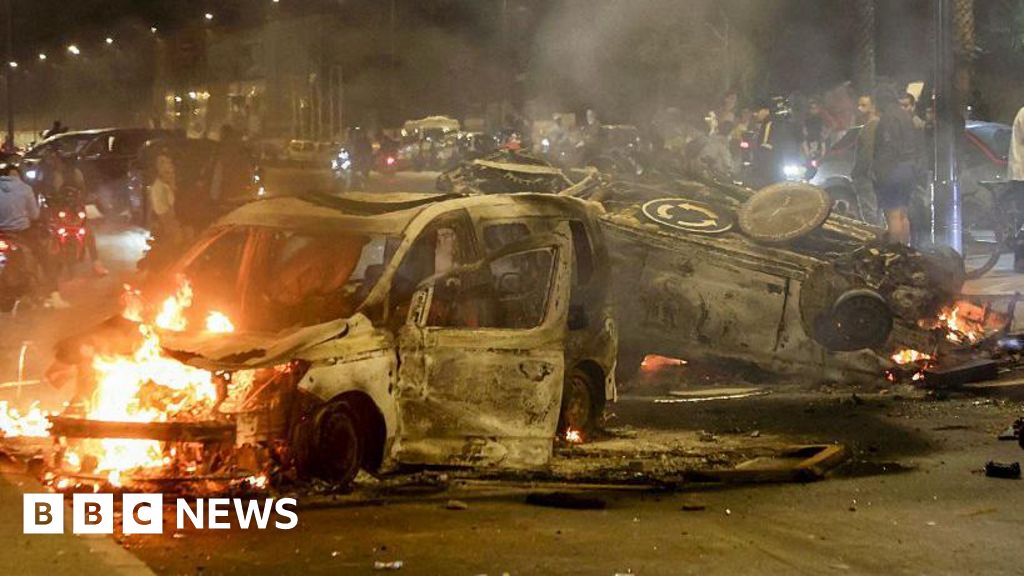First killings in Morocco since Gen Z protests erupted

```html Morocco: Deaths Reported as Protests Over World Cup Stadiums Escalate
At least two people have died in Morocco after police opened fire on protesters in Lqliaa, near Agadir, according to state media. The incident marks a significant escalation in the youth-led demonstrations that have swept across the country in recent days.
The protests, largely organized by young Moroccans, known as Gen Z, erupted over the government's decision to prioritize the construction of football stadiums for the 2030 FIFA World Cup, which Morocco will co-host with Spain and Portugal, over improvements to public services and addressing the country's economic challenges.
"Stadiums Here, But Where Are The Hospitals?"
The demonstrations, which began on Saturday, have seen protesters chanting slogans like "Stadiums are here, but where are the hospitals?" reflecting deep frustration with the perceived misallocation of resources. One protester from Oujda, speaking to BBC Newsday anonymously due to fear of reprisal, described the local hospital as being akin to a "jail," citing issues of cleanliness and alleged corruption among staff.
The state-owned news agency reported that police were forced to use live ammunition in "legitimate self-defence" on Wednesday evening after being attacked in Lqliaa. The Interior Ministry had previously stated that the right to peaceful protest would be upheld within the boundaries of the law.
GenZ 212 Distances Itself From Violence
The GenZ 212 movement, which has been instrumental in organizing the protests through social media, has distanced itself from the violence. The group lacks a formal leadership structure, making it difficult to pinpoint specific organizers or spokespeople.
Official statistics reveal that Morocco faces significant economic challenges. The unemployment rate is currently at 12.8%, but youth unemployment is alarmingly high, reaching 35.8%. Among university graduates, the unemployment rate is 19%, highlighting the lack of opportunities for young people.
Protests Spread Across Major Cities
The protests have extended beyond smaller towns like Lqliaa, impacting major urban centers including the capital, Rabat, the commercial hub of Casablanca, and the port city of Tangier. Marrakesh, a popular tourist destination, has also experienced unrest, with reports of protesters setting a police station ablaze.
According to Interior Ministry spokesman Rachid El Khalfi, over 400 people have been arrested across Morocco in connection with the protests. He also reported that more than 260 police officers and 20 protesters have been injured, and that dozens of vehicles have been damaged or destroyed.
Context: A History of Social Discontent
These protests are not entirely unprecedented in Morocco. While the country has enjoyed relative stability compared to some of its neighbours, it has a history of social discontent, often fueled by economic inequality and a perceived lack of government responsiveness. The Arab Spring uprisings of 2011 led to constitutional reforms in Morocco, but many argue that these reforms have not gone far enough in addressing the underlying issues of poverty and unemployment.
Expert Analysis: A Generational Divide
Dr. Fatima Akkad, a political analyst specializing in North African affairs at the University of Rabat, believes the protests reflect a growing generational divide. "Young Moroccans are increasingly connected to the world through social media, and they are acutely aware of the opportunities and living standards enjoyed elsewhere," she explains. "They are frustrated by the lack of economic prospects and the perceived corruption within the system. The World Cup stadiums have become a symbol of this disconnect between the government's priorities and the needs of the population."
Another expert, Ahmed Benomar, an economist based in Casablanca, points to the underlying economic pressures. "Morocco has made progress in certain sectors, particularly tourism and renewable energy, but these benefits have not been evenly distributed," he says. "The high youth unemployment rate is a major concern, and the government needs to implement more effective policies to create jobs and address the structural inequalities that are fueling social unrest."
Government Response and Future Outlook
The Moroccan government has expressed a willingness to engage in dialogue with the youth, but it has also defended the actions of the security forces. It remains to be seen whether the government will be able to address the root causes of the protests and prevent further escalation. The coming weeks will be crucial in determining the future of Morocco's political landscape.
```
Originally sourced from: BBC News Africa
